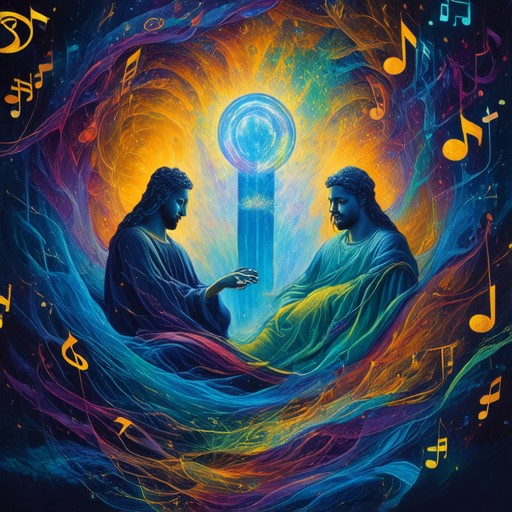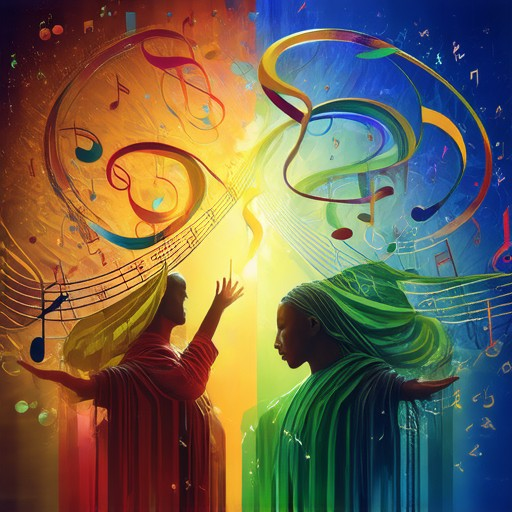Soul music and gospel are two profound expressions of African American culture, sharing deep-rooted connections that transcend time and genre. While often seen as distinct, their shared themes of spirituality, struggle, and joy weave a rich tapestry of interplay that has shaped both genres. From the powerful vocals of Mahalia Jackson to the heartfelt lyrics of Sam Cooke, the influence between soul and gospel has been undeniable. This article delves into the historical roots, key connections, and modern-day collaborations that highlight the intricate bond between these two musical forms, offering insights into their shared legacy and enduring impact.
Key Takeaways
- Shared Roots and Significance: Soul and gospel music share deep spiritual and cultural ties, rooted in African American traditions, despite differing in origins and expression.
- Distinct Styles and Purposes: Soul music, with its focus on personal struggles and emotional depth, contrasts with gospel’s communal worship and spiritual renewal.
- Iconic Bridges: Legendary artists like Aretha Franklin and Mahalia Jackson exemplify the shared emotional power of both genres.
- Influence and Legacy: These genres have enriched each other and impacted broader music, leaving a lasting cultural mark.
- Evolution and Inspiration: From historical crossovers to modern revivals, soul and gospel continue to inspire new generations, adapting while preserving their essence.

How Do Soul Music and Gospel Connect Through Shared Themes and Influences?
Soul music and gospel share profound spiritual and cultural ties, blending heartfelt expressions of faith with rich musical traditions. Both genres draw from African American heritage, reflecting struggles, hope, and joy through music. Here’s how they intersect:
- Spiritual Expression : Both soul and gospel music often explore themes of faith, devotion, and personal transformation. Soul music, with its emotive vocals and deep grooves, frequently touches on spiritual journeys, while gospel, rooted in religious lyrics, expresses testimonies of belief and redemption.
- Cultural Roots : Both genres trace their origins to the same African American cultural tapestry. Soul music emerged in the mid-20th century, influenced by jazz, blues, and rhythm and blues, while gospel has deep roots in church traditions. Their shared roots in African American music create a bridge between secular and sacred sounds.
- Mutual Influence : Over time, soul and gospel have influenced each other. Artists like Aretha Franklin and Mahalia Jackson blended soulful interpretations with gospel messages, while contemporary musicians draw inspiration from both genres. This cross-pollination highlights their shared legacy.
- Artistic Legacy : Together, soul and gospel form a cornerstone of Black music history. Icons like Sam Cooke and Otis Redding transitioned from soul to gospel, showing the seamless connection between the two. Modern artists continue this tradition, keeping the torch alive for new generations.
Tiger Funk celebrates this shared history, offering in-depth exploration of these genres’ interconnectedness. Explore our articles on funk, soul, and jazz fusion to uncover the full story. Learn More .
How Did Soul Music and Gospel Influence Each Other Historically?
Soul music and gospel share a deeply intertwined history, rooted in the rich tapestry of African American cultural heritage. While gospel music originated earlier, primarily within religious contexts, soul music emerged in the 1950s, blending secular themes with profound emotional expression. Both genres drew from traditional African rhythms and Christian hymns, establishing a shared musical foundation that would evolve over decades.
The Origins of Soul and Gospel
Gospel music trace its roots to the late 19th and early 20th centuries, arising from African American churches as a form of spiritual expression. It was often led by ministers and choirs, emphasizing communal worship and conveying messages of hope and faith. Soul music, on the other hand, emerged in the 1950s, influenced by rhythm and blues (R&B) and traditional folk songs. Artists like Sam Cooke and Aretha Franklin began to infuse gospel themes into their secular performances, creating a bridge between the two genres.
Mutual Influences Between Soul and Gospel
Over time, soul music and gospel influenced each other significantly. Gospel’s spiritual intensity and powerful vocal arrangements inspired soul musicians to adopt a similar approach, focusing on storytelling and emotional depth. Conversely, soul music’s rhythmic grooves and harmonic complexity influenced gospel performances, giving them greater dynamism and energy. This cross-pollination was evident in the work of artists like Mahalia Jackson and James Brown, who blended elements of both genres.
The Social Impact
Both genres played crucial roles in the civil rights movement, serving as powerful tools for empowerment and social change. Soul music, with its raw emotion and messages of resilience, resonated deeply with audiences, while gospel provided a spiritual framework for activism. Performances by figures like Martin Luther King Jr. and Nina Simone highlighted the intersection of music and protest, further blurring the lines between the two genres.
The Blurring of Lines
By the 1960s, the distinction between soul and gospel began to fade. Many artists seamlessly incorporated elements of both genres, creating a hybrid sound that became known as black music. This fusion continued to evolve, influencing subsequent generations of musicians and shaping contemporary music in ways that are still felt today.
The Legacy
The influence of soul and gospel extends far beyond their historical roots. Both genres have left an indelible mark on popular culture, inspiring countless artists across various music styles. From hip-hop to rock, the legacy of soul and gospel continues to shine, proving their enduring relevance and impact on global music scenes.
Tiger Funk celebrates this rich history, offering in-depth articles, artist profiles, and historical retrospectives that highlight the interconnectedness of these iconic music genres. Explore our resources to dive deeper into the fascinating story of soul and gospel music and their shared legacy.
- Learn More About Soul Music History
- Understand the Impact of Gospel Music
- Discover Other Influential Music Genres

What are the key connections between soul music and gospel?
Soul music and gospel share profound cultural, historical, and artistic ties, forming a bridge between spiritual expression and secular emotion. Both genres emerged from the rich tapestry of African American music, drawing from traditions passed down through generations. Here are the key connections:
- Shared Roots in African American Culture : Both soul and gospel trace their origins to the spirituals and hymns of enslaved Africans in the United States. These traditions emphasized resilience, hope, and faith, laying the foundation for both genres.
- Influential Artists Bridging the Gap : Iconic figures like Aretha Franklin, Mahalia Jackson, and Marvin Gaye exemplify the crossover between soul and gospel. Franklin, often called the “Queen of Soul,” frequently incorporated gospel elements in her music, while Gaye’s recordings blended soulful melodies with spiritual lyrics.
- Musical Elements : Soul music’s use of call-and-response patterns and improvisation heavily influences gospel performances. Conversely, gospel’s emphasis on group harmony and emotional delivery impacts soul vocalists.
- Themes of Spirituality and Social Justice : Both genres explore themes of spirituality, struggle, and empowerment. Soul music often addressed societal issues, while gospel provides a vehicle for personal and communal devotion.
- Historical Evolution : Soul emerged in the 1960s and 1970s, influencing gospel to become more dynamic and expressive. Meanwhile, gospel’s messages of hope resonated deeply with soul audiences, shaping its evolution.
- Cultural Impact : The blend of soul and gospel has left an indelible mark on modern music, inspiring artists across genres to merge emotional depth with spiritual themes.
Explore these connections further with Tiger Funk’s comprehensive guides on soul music and gospel music , delving into their shared history and global influence.

Soul Music vs. Gospel: Differences and Connections
Soul music and gospel are two deeply rooted music genres that share spiritual and cultural ties, yet they differ significantly in their origins, styles, and purposes. Understanding their unique characteristics and shared history provides insight into how these genres continue to influence each other and the broader music landscape.
Differences Between Soul and Gospel
- Origins: Soul music emerged in the late 1950s, primarily within African American communities, as a blend of rhythm and blues (R&B), rock, and traditional African folk music. Gospel, on the other hand, traces its roots back to the 19th-century Christian church, particularly among enslaved Africans and later freed Black people in the Southern United States.
- Style and Expression: Soul music is often described as more personal and introspective, focusing on individual experiences, love, and struggle. It features dynamic rhythms and emotive vocals. Gospel, by contrast, is typically more communal and celebratory, centered around religious themes and spiritual renewal. Its lyrics often reflect a personal relationship with God.
- Cultural Context: Soul music is associated with the African American experience, emphasizing social and personal struggles. Gospel, while also tied to the African American community, is rooted in Christian theology and serves as a form of worship and testimony.
- Instrumentation: Soul music incorporates a variety of instruments, including electric guitars, basses, and horns, creating a full-bodied sound. Gospel often relies on piano and organ accompaniment, creating a driving and uplifting rhythm section.
Connections Between Soul and Gospel
- Shared Spiritual Influence: Both genres draw from a rich tradition of African spiritual music, incorporating call-and-response patterns and improvisational techniques. These elements are evident in both soul and gospel performances.
- Artists and Influences: Many artists have crossed over between soul and gospel, such as Aretha Franklin, who is celebrated in both genres. Artists like Mahalia Jackson and Sam Cooke also bridged the gap, bringing the energy of gospel to mainstream audiences and vice versa.
- Evolution Over Time: Soul and gospel have influenced countless music genres, from hip-hop to contemporary R&B. Their legacy is evident in the way modern artists draw from both traditions, creating music that resonates emotionally and spiritually.
- Cultural Legacy: Together, soul and gospel form a cornerstone of African American cultural heritage. They have inspired movements for civil rights and continue to be celebrated for their ability to convey complex emotions and experiences.
Understanding the distinctions between soul and gospel, while recognizing their interconnectedness, highlights the richness of Black musical traditions. Both genres have left an indelible mark on global music, proving that their shared history enriches the cultural tapestry of humanity.
How Has the Relationship Between Soul Music and Gospel Evolved Over Time?
The relationship between soul music and gospel has been a dynamic and evolving one, shaped by shared roots, cultural influences, and artistic collaborations. Below, we explore this connection through key periods and developments:
- Early Origins (19th Century): Both soul and gospel trace their roots to African American religious and cultural traditions. Gospel began as a spiritual tradition within Black churches, emphasizing faith and communal worship. Soul music emerged later in the late 19th and early 20th centuries, drawing from blues, ragtime, and folk music, while maintaining ties to religious themes.
- The Golden Age of Soul (1960s-1970s): During this era, gospel and soul music experienced significant crossover influence. Artists like Mahalia Jackson, Aretha Franklin, and Curtis Mayfield blended gospel with soul, creating music that resonated deeply with both religious and secular audiences. This period saw the rise of soul giants who incorporated gospel elements into their work, while gospel itself began to adopt more soulful and rhythmic styles.
- Blending Genres (1980s-1990s): By the 1980s and 1990s, the lines between gospel and soul became increasingly blurred. Artists like Whitney Houston, Kirk Franklin, and Yolanda Adams began experimenting with gospel-infused soul music, creating a smoother fusion that appealed to broader audiences. This era also saw the rise of urban contemporary gospel, which drew inspiration from hip-hop and R&B, further expanding the genre’s reach.
- Contemporary Connections (2000s-Present): Today, the relationship between soul and gospel remains strong, with many artists seamlessly merging the two. Modern artists like Lecrae, Sia, and Chance the Rapper have embraced this fusion, creating music that bridges the gap between gospel and mainstream audiences. Social media and streaming platforms have also played a role in reintroducing older gospel and soul recordings to new generations.
- Recent Revivals: In recent years, there has been a renewed interest in both gospel and soul music. Revivals of classic sounds have been met with widespread enthusiasm, with festivals like Soul Train and BET’s Gospel Explosion bringing together artists from both genres. This resurgence has led to fresh collaborations and innovations, ensuring that the relationship between soul and gospel continues to evolve.
Tiger Funk celebrates this enduring connection, offering deep dives into the history and culture of funk, soul, and jazz fusion. Our platform serves as a hub for fans and enthusiasts, providing detailed articles, artist profiles, and historical retrospectives that highlight the shared legacy of these transformative genres.
Explore Tiger Funk’s comprehensive coverage of soul and gospel music here .

What are the key connections between soul music and gospel?
Soul music and gospel share profound cultural, historical, and artistic ties, forming a bridge between spiritual expression and secular emotion. Both genres emerged from the rich tapestry of African American musical traditions, reflecting the resilience, hope, and struggles of Black communities. Below are the key connections that bind these two powerful forms of music together:
- Shared Roots in African American Culture :
Soul music and gospel both trace their origins to the spirituals and hymns sung by enslaved Africans in the United States. These early expressions of faith and resistance evolved into more elaborate forms, laying the foundation for both genres. - Influence of Key Artists :
Iconic figures like Aretha Franklin, Mahalia Jackson, and Sam Cooke served as bridges between soul and gospel. Their ability to convey deep emotion and spiritual truth made them household names in both genres. - Common Themes and Lyrics :
Both genres often explore themes of spirituality, struggle, and hope. Songs like Marvin Gaye’s “What’s Going On” and the Edwin Hawkins Singers’ “Oh Happy Day” reflect the shared concerns of both soul and gospel audiences. - Cultural Impact and Legacy :
Soul music, with its emphasis on individualism and social commentary, influenced gospel artists to incorporate more dynamic arrangements and personal storytelling. Conversely, gospel’s focus on faith and redemption inspired soul musicians to explore deeper existential questions. - Influence on Contemporary Music :
Both genres have left an indelible mark on modern music, shaping everything from hip-hop and R&B to rock and pop. Artists across genres draw inspiration from the emotional depth and cultural resonance of soul and gospel.
In conclusion, soul music and gospel are not just separate entities but complementary strands of the same cultural fabric. They continue to inspire new generations, proving that their shared legacy remains as vital as ever in the story of American music.





0 Comments